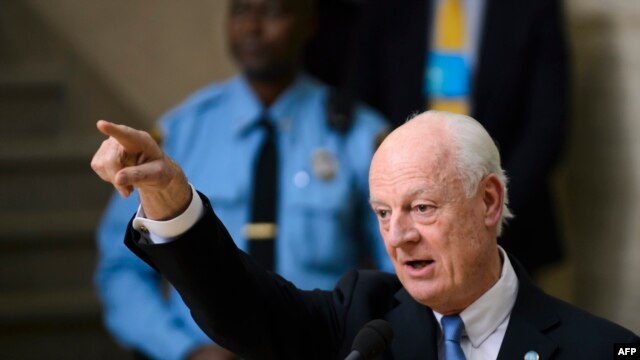Syrian opposition unsure about participation in Geneva talks
| Publisher | Radio Free Europe/Radio Liberty |
| Publication Date | 31 January 2016 |
| Cite as | Radio Free Europe/Radio Liberty, Syrian opposition unsure about participation in Geneva talks, 31 January 2016, available at: https://www.refworld.org/docid/56c4298125.html [accessed 21 May 2023] |
| Disclaimer | This is not a UNHCR publication. UNHCR is not responsible for, nor does it necessarily endorse, its content. Any views expressed are solely those of the author or publisher and do not necessarily reflect those of UNHCR, the United Nations or its Member States. |
January 31, 2016
By RFE/RL
 UN envoy to Syria Staffan de Mistura at the opening of Syrian peace talks at the United Nations offices in Geneva on January 29.
UN envoy to Syria Staffan de Mistura at the opening of Syrian peace talks at the United Nations offices in Geneva on January 29.
Syria's largest mainstream opposition group has arrived in Geneva and has expressed eagerness in seeing the Syrian conflict end, but it is unclear if it will actually participate in UN-brokered talks currently taking place in the Swiss city.
Higher Negotiation Committee (HNC) spokesman Salim al-Muslat told reporters on January 31 that the group wanted to see some positive developments on the ground before entering the intra-Syrian negotiations that include representatives from the Syrian interim government.
Since arriving in Geneva from Riyadh on January 30, Muslat has made clear that the HNC first wants to see that the international community is serious about addressing its demands that Damascus release women and children from government jails and allow aid into besieged areas.
"We are keen to start negotiations and need to see that the international community takes serious steps toward implementing the [UN Security Council] Resolution [2254 on Syria] that has been signed by 15 members of the [UN] Security Council," Muslat said on January 31. "It is important for us to see that food goes to our [Syrian] children who are being starved to death. To see that Syrian families, Syrian women, are safe sitting in their homes – in their houses – away from the strikes of the Russians."
Muslat's comments came after HNC members met with UN mediator Staffan de Mistura at a hotel on January 31, reportedly after threatening to leave Geneva. Reuters subsequently cited HNC coordinator Riad Hijab as saying in a statement that the group would walk out of the talks if the UN failed to end "regime violations."
The head of the Damascus delegation, Bashar Jaafari – who is also Syria's UN ambassador – was quoted by Interfax as saying that the delays indicated that the opposition was "not serious."
The participation of the Saudi-backed HNC, whose delegation includes political and militant opponents of Syrian President Bashar al-Assad, is seen as key to the talks' success in ending Syria's five-year civil war.
A UN Security Council resolution passed last month demands that all sides allow immediate humanitarian aid to all besieged areas, release arbitrarily detained prisoners, and stop attacking civilian areas.
Russian Foreign Minister Sergei Lavrov and U.S. Secretary of State John Kerry earlier agreed by telephone to assess the Geneva talks at an international meeting in Munich on February 11.
The UN has not said who was invited to attend the talks, which began on January 29, but the extremist Islamic State group and the Al-Qaeda affiliated Al-Nusra Front are not participating. The presence of Kurdish representatives has also been a divisive issue.
Officials from Syria's largest Kurdish group – the Democratic Union Party, or PYD – left Geneva on January 30 after being excluded from the negotiations, a Kurdish official said.
Turkey considers the PYD a terrorist organization and the HNC claims they are too close to the Syrian government.
The UN has said the aim of the Syrian peace negotiations would be six months of talks, first seeking a cease-fire, later working toward a political settlement to a war that has killed more than 250,000 people, driven more than 10 million from their homes, and drawn in world powers.
Based on reporting by AP, AFP, and Reuters
Link to original story on RFE/RL website
